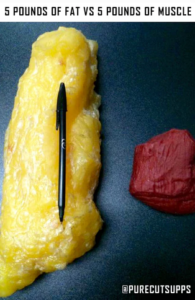By Jade Whitehurst
I remember when I was a kid I used to love asking, “What’s heavier, a ton of feathers or a ton of bricks?” Then I anxiously waited to say, “Got ya! They weigh the same!” to anyone who said the bricks weighed more.
As a health and fitness coach, weight is a hot topic of discussion with my clients, and rightfully so. The reason most people begin their health and fitness journey is either the desire to lose weight or keep it under control. Therefore, naturally we pick up our scales, dust them off and start tracking our progress. However, let’s refer back to my feathers vs. bricks question. A pound is a pound, no matter the substance, right? Well, our bodies are no different!
Have you ever started a new fitness program, and you’re putting in the work, checking your boxes, feeling proud of yourself, and then in four to six weeks the number on the scale hasn’t budged – or, gasp – it’s gone up? The frustration and panic that begins to boil inside is a real thing, and sadly this is where a lot of fitness goals go to die.
That is why I teach my clients that your weight is not the best indicator of your results. Muscle and fat have different properties and effects on our bodies. A pound of muscle and a pound of fat weigh the same, but the appearance is totally different!
I think it’s important for anyone starting their health and fitness journey to understand this. The more you know about this topic, the more you can understand (and not get frustrated by) the process.
Here are a few differences between muscle and fat:
- Density. Muscle is denser than fat, meaning it takes up less space. That’s why gaining muscle can make you look leaner and more toned, even if your weight remains the same or goes up!
- Metabolism. Muscle tissue is metabolically active and burns more calories than fat tissue. The more muscle you have, the higher your resting metabolic rate is. This makes it easier to maintain a healthy weight.
- Health implications. It’s natural for our bodies to have some fat! In fact, it’s beneficial. However, excessive fat accumulation, especially visceral fat, is linked to an increased risk of various health conditions such as heart disease. On the other hand, having higher muscle mass is associated with better metabolic health and overall wellbeing.
Let this be an encouragement to you not to let the scale be your number one indicator of health and fitness. I encourage my clients to think fat loss, not weight loss, and to focus more on non-scale victories, such as:
- Taking their measurements.
- Tracking their progress with transformation photos.
- Focusing on energy levels and morale.
- Noting how their clothes fit.
The number on the scale does not speak the whole story! Focus on building muscle through regular exercise, weight training, and a balanced diet to improve your body composition and overall health.

Jade Whitehurst is a wife, mom, fitness coach, and eighth-grade science teacher. You can follow her on Instagram @jadewhitehurst_thefaithfitmom.

